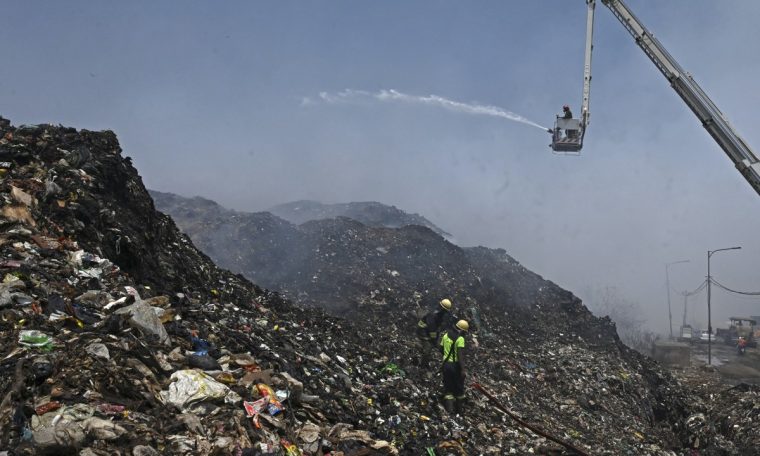
An unprecedented heat wave affects India and PakistanDue to which lakhs of people are facing power cuts and water shortage. Thermometers reach 50 °C in some areas.
The region has been experiencing rising temperatures for weeks. In March, the thermometer in New Delhi recorded 40.1 degrees Celsius, a temperature not seen at this time of year since 1946. On Thursday (28), 46 degree facing Indian capitalMaking life difficult for residents, especially those who have to work outside.
“I drink more than 5 liters of water a day. This is the only thing I can do”, says Mohammad, a 50-year-old worker who carried large pieces of metal on his shoulders in the scorching sun in the middle of the day . “I have to work to live”, he recalls as he lives at the construction site. “I sleep here. At least we have a fan”, he tries to console himself.
Mohamed works in one of the most sophisticated areas of the capital, which is witnessing a boom in the construction sector. But work has already started under the influence of high temperatures.
An excavator tries to extinguish a naturally occurring fire caused by heat in India’s capital New Delhi (Photo: Adnan Abidi/Reuters)
“In the last few days, some workers left because they had suffered a lot from the heat,” says foreman Mohammad Yasin. “Those who stayed have to stop several times a day to rest, which delays the construction”, he remarked.
The heat breaks out in the middle of Ramadan, the traditional Muslim fast that ends at the end of this week. Those who respect this practice go from sunrise to sunset without food, making working conditions even more difficult. More than 200 million people follow Islam in India.
A fire broke out in a garbage dump in the north of the capital on Thursday and according to local officials, the fire was caused by high temperatures. It took firefighters hours to douse the blaze, making the air quality in the metropolis even more unbearable.
Three more fires broke out in less than a month at Ghazipur, the capital’s biggest dump, which is a 65-metre-high mountain of garbage. The city of more than 20 million residents lacks modern infrastructure to treat the 12,000 tonnes of waste generated daily.
A man breaks a snowflake to be distributed among residents of Ahmedabad, India – Photo: Amit Dave / Reuters
Heat waves killed more than 6,500 people in India since 2010, Scientists say they are occurring more frequently, but also more severe, because of climate change. “The summer heat that India experienced earlier this month was only seen once every 50 years,” says Maryam Zakaria of the Grantham Institute at Imperial College London.
agriculture of Pakistan in danger
Feather Pakistan According to the Pakistan Meteorological Society, the temperature in some areas is also 8 degrees above normal, which has reached 48 degrees in some areas.
Heat and lack of rain directly affect farmers, who must manage the water supply in this country, where agriculture, the backbone of the economy, employs about 40% of the total workforce. “The country’s public health and agriculture will face serious threats from this year’s extreme temperatures,” summarizes climate change minister Sherry Rahman.
Pakistanis trying to take a bath in the lake on a hot day – Photo: Akhtar Soomro/Reuters
High temperatures also cause an explosion in power consumption. in many cities Pakistan There has been a power outage for eight hours already. Power plants have also started running out of coal to operate their activities. According to Pakistani Energy Minister Khurram Dastgir Khan, the power crisis is already affecting the entire country.
In Rajasthan, northwest India, and the neighboring state of Gujarat, but also in Andhra Pradesh, further south, power cuts have been made at factories to reduce consumption. According to local media, even big power plants are facing coal shortage.



